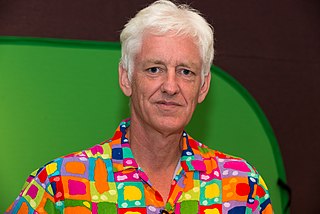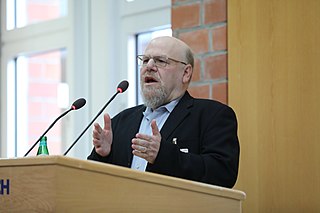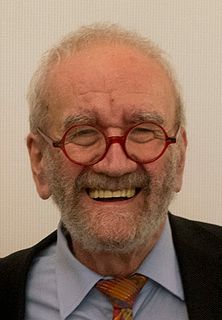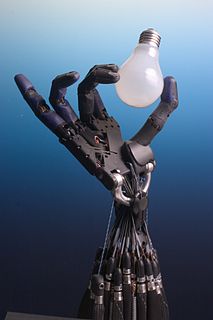
Marvin Lee Minsky was an American cognitive scientist concerned largely with research of artificial intelligence (AI), co-founder of the Massachusetts Institute of Technology's AI laboratory, and author of several texts concerning AI and philosophy.
The technological singularity is the hypothesis that the invention of artificial superintelligence (ASI) will abruptly trigger runaway technological growth, resulting in unfathomable changes to human civilization.

Edward Albert "Ed" Feigenbaum is a computer scientist working in the field of artificial intelligence, and joint winner of the 1994 ACM Turing Award. He is often called the "father of expert systems."

Dabbala Rajagopal "Raj" Reddy is an Indian-American computer scientist and a winner of the Turing Award. He is one of the early pioneers of Artificial Intelligence and has served on the faculty of Stanford and Carnegie Mellon for over 50 years. He was the founding director of the Robotics Institute at Carnegie Mellon University. He was instrumental in helping to create Rajiv Gandhi University of Knowledge Technologies in India, to cater to the educational needs of the low-income, gifted, rural youth. He is the chairman of International Institute of Information Technology, Hyderabad. He is the first person of Asian origin to receive the ACM Turing Award, in 1994, the highest award in computer science, for his work in the field of artificial intelligence.

John McCarthy was an American computer scientist and cognitive scientist. McCarthy was one of the founders of the discipline of artificial intelligence. He coined the term "artificial intelligence" (AI), developed the Lisp programming language family, significantly influenced the design of the ALGOL programming language, popularized timesharing, and was very influential in the early development of AI.

SRI International (SRI) is an American nonprofit scientific research institute and organization headquartered in Menlo Park, California. The trustees of Stanford University established SRI in 1946 as a center of innovation to support economic development in the region.

Peter Norvig is an American computer scientist. He is a director of research at Google Inc., and used to be its director of search quality.

James Alexander Hendler is an artificial intelligence researcher at Rensselaer Polytechnic Institute, United States, and one of the originators of the Semantic Web.
Nils John Nilsson is an American computer scientist. He is one of the founding researchers in the discipline of artificial intelligence. He is the first Kumagai Professor of Engineering (Emeritus) in Computer Science at Stanford University, position that he held since the chair was established in 1990 through 1995. He is particularly famous for his contributions to search, planning, knowledge representation, and robotics.
The ethics of artificial intelligence is the part of the ethics of technology specific to robots and other artificially intelligent beings. It is typically divided into roboethics, a concern with the moral behavior of humans as they design, construct, use and treat artificially intelligent beings, and machine ethics, which is concerned with the moral behavior of artificial moral agents (AMAs).
The Florida Institute for Human & Machine Cognition (IHMC) is a not-for-profit research institute of the State University System of Florida, with locations in Pensacola and Ocala, Florida. IHMC scientists and engineers investigate a broad range of topics related to building technological systems aimed at amplifying and extending human cognitive, physical and perceptual capacities. These include artificial intelligence, robotics, human-centered computing, agile and distributed computing and many related areas.
Ruzena Bajcsy is an American engineer and computer scientist who specializes in robotics. She is Professor of Electrical Engineering and Computer Science at the University of California, Berkeley, where she is also Director Emerita of CITRIS.
Michael Peter Georgeff is a computer scientist and entrepreneur who has made contributions in the areas of Intelligent Software Agents and eHealth.
Machine ethics is a part of the ethics of artificial intelligence concerned with the moral behavior of artificially intelligent beings. Machine ethics contrasts with roboethics, which is concerned with the moral behavior of humans as they design, construct, use and treat such beings. Machine ethics should not be confused with computer ethics, which focuses on professional behavior towards computers and information. It should also be distinguished from the philosophy of technology, a field that is predominantly concerned with the ethical standing of humans who use technological products, given that machine ethics regards artificially intelligent machines as actual or potential moral agents.
The Allen Institute for Artificial Intelligence is a research institute founded by late Microsoft co-founder Paul Allen. The institute seeks to achieve scientific breakthroughs by constructing AI systems with reasoning, learning, and reading capabilities. Oren Etzioni was appointed by Paul Allen in September 2013 to direct the research at the institute.
Paolo Petta is an Italian computer and cognitive scientist who is the head of the Intelligent Software Agents and New Media Research Group at the Austrian Research Institute for Artificial Intelligence. His main research areas include cognitive modelling of emotions, human aspects in interactions with artificial systems and coordination of situated cognitive systems.

The Future of Life Institute (FLI) is a volunteer-run research and outreach organization in the Boston area that works to mitigate existential risks facing humanity, particularly existential risk from advanced artificial intelligence (AI). Its founders include MIT cosmologist Max Tegmark, Skype co-founder Jaan Tallinn, and its board of advisors includes entrepreneur Elon Musk and cosmologist Stephen Hawking.
Henry A. Kautz is a computer scientist, Founding Director of Institute for Data Science and Professor at University of Rochester. He is interested in knowledge representation, artificial intelligence, data science and pervasive computing.
Existential risk from artificial general intelligence is the hypothesis that substantial progress in artificial general intelligence (AGI) could someday result in human extinction or some other unrecoverable global catastrophe. For instance, the human species currently dominates other species because the human brain has some distinctive capabilities that other animals lack. If AI surpasses humanity in general intelligence and becomes "superintelligent", then this new superintelligence could become powerful and difficult to control. Just as the fate of the mountain gorilla depends on human goodwill, so might the fate of humanity depend on the actions of a future machine superintelligence.










